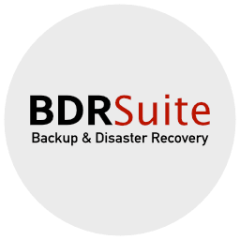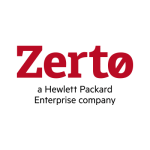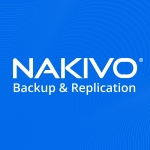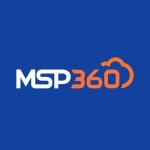What is our primary use case?
Mainly, we use it for our backup recovery. If you have relevant data, we need to make backups similar to the data to ensure that we can export it in the case of any emergency or disaster. The main use case is disaster recovery for relevant data to be able to survive after any disaster.
I have two deployments. One of them is Hyper-V deployment with backup for Hyper-V virtual machines. The other one with backup for the Vembu virtual infrastructure version. Both of them are on-premises. There is nothing on the cloud.
How has it helped my organization?
All our clients have been happy with the backup and restore features.
What is most valuable?
It is easy. You can save a lot with their features, without a lot of hassle. You can design your backups closely and flexibly without a lot of details or variables. It is very straightforward. You can put what you want in the right place in a very short amount of time.
The speed of the solution’s restores is good. It is dependent on the infrastructure and the nature of the connection between the storage and servers. Overall, it is good. There are no problems when using it.
You can restore all your data or partial parts of it. You can restore a specific version of the data. It has a lot of options for restore, so you can have the correct data that you want to restore. This is very important. You must know what you are going to restore. Otherwise, you may be overwriting correct data with other data. You must know what specific files you are restoring as well as which version. Partial restore is very important because there might be some files which are newer than the backup and some files that are corrupted. You need to restore some files from the backup, but not all the files.
We have the VM replication. We can copy a VM to another host with VM replication.
What needs improvement?
Maybe they can add some features regarding working with the vCenter cluster to be able to have more power over the cluster overall, not just over a single or specific host. Also, I would like some enhancements in technology for the web interface, e.g., some interactive technologies to advance the interface of Vembu. Although the current interface is very good, maybe they can use more advanced technologies for its web development.
For how long have I used the solution?
I have been using it for about a year.
What do I think about the stability of the solution?
For the entire time that I have used Vembu, I didn't encounter any issues. It is very consistent and nothing failed nor was corrupted.
I have three people trained on the solution, and the main person is leading the support. They are IT specialists. The role of backup administrator is assigned to them. They keep track of the backup operations done daily or weekly. If something needs to be restored, they are responsible for restoring it.
What do I think about the scalability of the solution?
Scalability is good.
I am backing up two environments: Hyper-V and VMware. One of them is about 40 VMs, and the other about 60 to 65 VMs, supported by three machines that are dual sockets each.
How are customer service and support?
The main component in the backup solutions is compatibility. The backup is located on the hard disk, and I didn't face any corruption of data, which is very valuable. When something happens as an error, there is technical support who gives us the reason why this error is emerging. In most of the cases, the errors are emerging from the operating systems in which you are trying to back up. Sometimes, the client refuses to connect, etc. All this is under control and can easily be solved.
I refer a lot to the knowledge base on the website, which is very good. I haven't needed to contact support persons interactively.
How was the initial setup?
I tried to install it twice on Linux just for testing, and I succeeded, but it was picky sometimes, because there are a lot of options with command line interface. So, it was a challenge to get it to work on many operating systems. However, on Windows, the setup was very straightforward and no problem at all.
Using Windows to deploy takes not more than five minutes. It is very fast. For Linux, it takes about half an hour to an hour, according to the problems that we would face.
We tried to restore it mainly on the physical machines, not virtual. The hardware that it is deployed on is very reliable. We faced problems on the backup machine itself. The machine, which functions to store the data, must be very reliable. You also need to keep it away from any disaster or security exposure.
What about the implementation team?
I did contact their technical guys for some technical discussions before we deployed one of the instances that we used. They were very good and helpful.
What was our ROI?
Manually restores or restores from manual backups are very hard. They take some time. Restoring from a platform software, like Vembu, makes things very easier, particularly the speed to restore which version, which state, and to where. So, you speed up the overall operation by 20% to 25%.
The ROI is very good because you have the safety of being protected by backing up your data a lot. If an incident happens, then we can restore valuable data, save a lot of money, and preserve the continuity of the business. This is a big benefit which provides a lot of value.
What's my experience with pricing, setup cost, and licensing?
The pricing of Vembu is one of its strong points. The license is not as much as other competitors, and it has a variety of licensing options: subscription-based, perpetual licenses, and a virtual machine license. You can design whatever license that you adopted to your environment, and that can support your environment without extra cost, providing more than you need. So, you can design a license that fits your environment and budget. The pricing is very good and can be used when the budget is tight.
Which other solutions did I evaluate?
I used Veeam software for a while, but as a trial. I didn't support it because their prices are very high. I think Vembu provides the most resolution for our backups.
I use the Microsoft Windows Backup tool sometimes. However, it feels like a very heavy tool, not a sophisticated tool.
I know that there are features that are more advanced with other competitors, but those are not needed often.
What other advice do I have?
I used Vembu's Data Integrity Check once when doing an integrity check for the backup. If I have doubts that the backup is good or bad, it might be good for that, but I haven't used it a lot.
I encouraged you very much to engage with Vembu. Vembu is a really good software. I was convinced to use the company and software the first time that I saw it. I recommend it to everyone I know. It is a very powerful backup solution with a good price.
I would rate it as nine out of 10.
Disclosure: PeerSpot contacted the reviewer to collect the review and to validate authenticity. The reviewer was referred by the vendor, but the review is not subject to editing or approval by the vendor. The reviewer's company has a business relationship with this vendor other than being a customer: Partner















Thank you for your feedback. Good to know that our product has met all your backup requirements. For any updates or queries, you can reach our team through vembu-support@vembu.com.